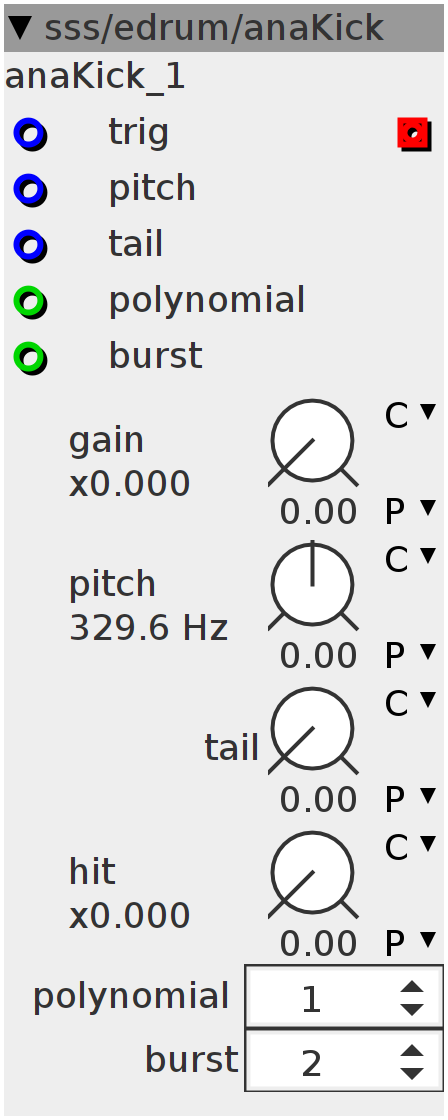anaKick
Based on a stripped version of my mostFilter3 design, this emulates an impulse driven resonator. The impulse is an lfsr-burst with controllable polynomial and burst length, this should allow a fair amount of different clicks for your kick. The impulse is also used to drive the "hit" modulation of the pitch. Tail is the resonance of the filter, which is set to a really low damping for a longer resonance tail.
Inlets
frac32 trig
frac32 pitch
frac32 tail
int32 polynomial
int32 burst
Outlets
frac32buffer out
Parameters
frac32.u.map.gain gain
frac32.u.map.gain hit
frac32.s.map.pitch pitch
frac32.u.map tail
int32 polynomial
int32 burst
int32_t pos;
int32_t spd;
int32_t v27 = 1 << 27;
int32_t prv;
int32_t th;
int32_t lp;
int32_t burst;
uint32_t state;
int32_t count;
int32_t ntrig;
int32_t lvl;
int32_t vi10 = (1 << 10) - 1;state = 0;
count = 0;
ntrig = 0;
burst = 0;int32_t damp = (int32_t)((v27 - __USAT(param_tail + inlet_tail, 27) * 0.99))
<< 3;
int32_t qnt = param_burst + inlet_burst;
qnt = qnt - qnt / 9 * 9;
qnt += qnt < 0 ? 10 : 1;
qnt = (1 << qnt) - 1;
if ((inlet_trig > 0) && !ntrig) {
state = 1;
count = qnt;
ntrig = 1;
lvl = inlet_trig;
} else {
if (!(inlet_trig > 0))
ntrig = 0;
}
int32_t polynomial = (inlet_polynomial + param_polynomial) & vi10;if (count > 0) {
count--;
if (state & 1) {
state = (state >> 1) ^ polynomial;
burst = lvl;
} else {
state = (state >> 1);
burst = -lvl;
}
} else
burst = 0;
int32_t in;
int32_t ts = __SSAT(burst, 28);
int32_t tsq31 = ts << 3;
int32_t tsq31p3 = ___SMMUL(tsq31, ___SMMUL(tsq31, tsq31));
in = ts + (ts >> 1) - (tsq31p3);
int32_t frq;
MTOF(__SSAT(param_pitch + inlet_pitch + ___SMMUL(burst << 2, param_hit), 29),
frq)
frq = frq >> 5;
lp += ___SMMUL((in - lp) << 1, frq << 1) << 1;
int32_t Tmp;
Tmp = lp - in;
int32_t LP = in + (Tmp >> 1);
spd += ___SMMUL((LP - pos), frq) << 3;
pos += spd;
int32_t dp = LP - pos;
dp = dp > 0 ? dp : -dp;
dp = dp >> 2;
dp = ___SMMUL(dp, ___SMMUL(dp, dp) << 5) << 5;
pos -= ___SMMUL(pos, __USAT(dp, 26)) << 5;
pos -= ___SMMUL(pos, __USAT(damp, 30)) >>
6; // set 6 to an even higher number to create longer tails
int32_t out;
ts = __SSAT(pos + ___SMMUL(param_gain, pos << 2), 28);
tsq31 = ts << 3;
tsq31p3 = ___SMMUL(tsq31, ___SMMUL(tsq31, tsq31));
out = ts + (ts >> 1) - (tsq31p3);
outlet_out = out >> 1;
prv = spd;